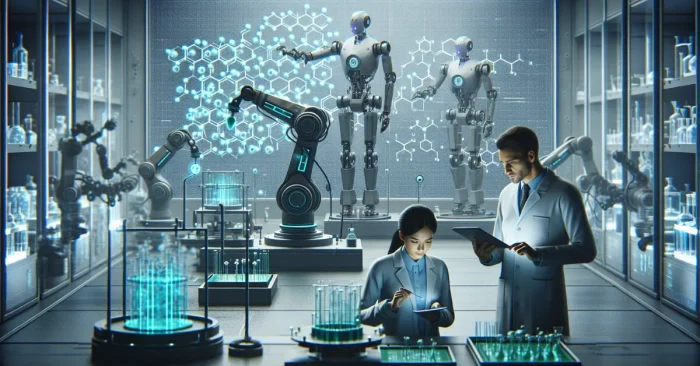Overview
AI tools for chemistry labs are revolutionizing research, experimentation, and chemical analysis by enabling smarter, faster, and more accurate workflows. These tools use artificial intelligence, machine learning, and predictive modeling to optimize experiments, analyze chemical structures, and predict reaction outcomes. AI assists chemists in discovering new compounds, automating repetitive tasks, and minimizing errors in laboratory processes. From drug discovery and materials science to analytical chemistry and process optimization, AI-powered tools enhance productivity, reduce costs, and accelerate innovation. By integrating AI into chemistry labs, researchers gain deeper insights, improve safety, and drive breakthroughs that would be difficult or time-consuming using traditional methods.
1. ChemDraw – AI Molecular Design
ChemDraw leverages AI to assist chemists in drawing, analyzing, and predicting molecular structures. AI algorithms suggest chemical reactions, detect structural errors, and provide insights into molecular properties. The platform helps streamline research workflows, optimize experimental planning, and accelerate drug and material discovery. By using ChemDraw, laboratories can improve accuracy, reduce manual errors, and save time in chemical documentation and analysis.
2. IBM RXN for Chemistry – AI Reaction Prediction
IBM RXN for Chemistry integrates AI to predict chemical reactions and synthesize new compounds. Machine learning algorithms analyze reaction data, suggesting optimal conditions and potential outcomes. The platform supports chemists in planning experiments, reducing trial-and-error efforts, and enhancing research efficiency. AI-driven predictions improve accuracy, save resources, and accelerate the discovery of novel molecules in pharmaceutical, academic, and industrial chemistry labs.
3. DeepMatter – AI Lab Automation
DeepMatter uses AI to automate chemical experiments and data collection in labs. Its platform monitors reactions in real-time, analyzes results, and optimizes experimental protocols. AI algorithms identify patterns and anomalies, improving reproducibility and accuracy. DeepMatter reduces human error, enhances laboratory efficiency, and supports high-throughput experimentation for research in drug discovery, materials science, and chemical engineering.
4. LabTwin – AI Digital Lab Assistant
LabTwin combines AI with voice recognition and lab automation to assist chemists in daily tasks. The AI assistant records experiment data, provides step-by-step guidance, and suggests optimizations. LabTwin integrates with lab instruments and databases, enabling efficient workflow management. By leveraging AI, labs can reduce manual documentation, improve data accuracy, and enhance productivity, allowing chemists to focus on critical research tasks.
5. Benchling – AI Research Platform
Benchling uses AI to manage chemical and biological research data. Its AI algorithms analyze experiments, track molecular data, and suggest next steps for synthesis or testing. The platform enhances collaboration, data organization, and reproducibility in chemistry labs. By integrating AI, Benchling accelerates research, improves experimental outcomes, and supports efficient management of complex chemical projects in academic and industrial settings.
6. AiCure – AI Lab Compliance
AiCure applies AI to ensure compliance and monitoring in chemistry labs. The platform uses computer vision and AI analytics to track lab procedures, detect anomalies, and ensure safety protocols are followed. By automating monitoring and documentation, AiCure helps labs maintain regulatory compliance, reduce human error, and enhance safety while enabling researchers to focus on scientific experimentation.
7. Schrödinger – AI Molecular Modeling
Schrödinger leverages AI for molecular modeling, drug discovery, and chemical simulations. Its AI algorithms predict molecular interactions, optimize compound design, and suggest synthetic pathways. Schrödinger enhances computational chemistry workflows, accelerates R&D processes, and improves accuracy in predicting chemical and biological properties. By using AI, chemists can streamline research, reduce experimental costs, and discover novel compounds more efficiently.
8. Molecular AI – AI Reaction Optimization
Molecular AI uses machine learning to optimize chemical reactions and predict outcomes. AI algorithms analyze reaction data, propose conditions, and reduce experimental trial-and-error. The platform supports chemists in improving yields, minimizing waste, and accelerating research timelines. By integrating AI, Molecular AI enhances lab efficiency, ensures reproducibility, and facilitates faster discovery of new molecules in academic and industrial chemistry research.
9. PerkinElmer Signals Notebook – AI Lab Data Management
Signals Notebook integrates AI to manage laboratory data and experimental records. AI algorithms analyze chemical data, identify trends, and suggest optimizations. The platform enables secure documentation, collaboration, and compliance in chemistry labs. By leveraging AI, labs can improve data integrity, streamline workflows, and accelerate research productivity while minimizing errors and manual effort.
10. Chematica – AI Synthesis Planning
Chematica uses AI to plan chemical synthesis routes and predict reaction pathways. Its algorithms analyze chemical databases and propose optimal synthesis strategies. The platform supports chemists in designing efficient experiments, reducing resource consumption, and enhancing reproducibility. AI-driven synthesis planning accelerates discovery in pharmaceuticals, materials, and specialty chemicals, making lab research more efficient and innovative.
(FAQs)
Q1: How do AI tools benefit chemistry labs?
AI tools enhance chemical research by predicting reactions, automating experiments, managing data, optimizing workflows, and improving accuracy and reproducibility in lab processes.
Q2: Are AI lab tools suitable for both academic and industrial labs?
Yes, tools like ChemDraw, IBM RXN, and Schrödinger are scalable and used in academic research, pharmaceutical development, and industrial chemical labs for efficient experimentation.
Q3: Can AI tools reduce errors in chemistry experiments?
Absolutely, AI assists in reaction prediction, workflow automation, and data analysis, minimizing human error and enhancing the accuracy of chemical research and lab operations.
Learn More About AI Course https://buhave.com/courses/learn/ai/






